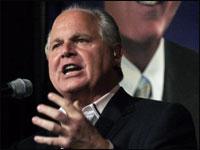BOB GARFIELD: The party ain't over, says Limbaugh, not as long as he’s around to play Twister with the Democrats.
RUSH LIMBAUGH: We are being told that we have to hope he succeeds, that we have to bend over, grab the ankles, bend over forward, backward, whichever, because his father was black, because this is the first black president.
BOB GARFIELD: Last week he was reportedly asked by what he called “a major American print publication” to explain in 400 words his hope for the Obama presidency. He couldn't resist.
RUSH LIMBAUGH: I don't need 400 words, I need four: I hope he fails!
BOB GARFIELD: A week ago, the President decided to address the onslaught directly, reportedly telling GOP leaders that they should direct their attention to the problems at hand, that they, quote, “can't just listen to Limbaugh and get things done.” What are we to think when our President engages in a tit-for-tat with radio’s star bloviator? Byron York, the White House correspondent for The National Review, is here to tell us. Byron, welcome back to the show.
BYRON YORK: Thank you.
BOB GARFIELD: So this all began when Rush Limbaugh said he hopes the president will fail. Mostly opposition voices wish the best of luck to the president while expressing skepticism that the president’s policies will succeed. Seldom does someone say, I actually hope he screws it all up.
BYRON YORK: Well, I think that he later clarified, saying that he hopes that Barack Obama fails to bring about a new era of liberal government, that President Obama tries to implement liberal policies, then Rush Limbaugh hopes he fails at it.
BOB GARFIELD: Now [LAUGHS] Limbaugh may or not be the de facto leader of the Republican Party, but we do know that he is very influential. Tell me about Phil Gingrey and Tom Price, two Republican [LAUGHS] congressmen, and what happened to them this week.
BYRON YORK: There was a story in The Politico that quoted Representative Tom Price, head of the Republican Study Group, which has actually come up with a Republican alternative on the plan for the stimulus, quoted him criticizing not only Limbaugh but, I believe, Sean Hannity and Newt Gingrich, as well. The article is published, gets a lot of attention. Rush Limbaugh actually responds to it on his radio program, whereupon [LAUGHS] Representative Price sends out frantic e-mails – his press secretary does – saying, wait a minute, Representative Price never said this, did not say it, and, as it turned out, that Representative Phil Gingrey, another Republican, actually had said it. And Price was very, very eager to make sure that people knew that he, Representative Price, did not criticize Rush Limbaugh.
BOB GARFIELD: [LAUGHS]
BYRON YORK: As for Gingrey, who actually did, he had to issue [LAUGHS] a clarification which most people are viewing as kind of an apology. So, you know, if you’re a Republican congressman, what’s in it for you by criticizing Limbaugh, especially when you’re both pretty much on the same side on this rather major issue facing the Congress?
BOB GARFIELD: Do you think that Limbaugh is genuinely standing up for principles, or is he just up to his usual blowhard tricks of trying to get attention cast on himself?
BYRON YORK: I would bet the mortgage that Limbaugh genuinely believes in the conservative principles he talks about. He’s talked about ‘em for years and years and years, and if he could make a lot of money by playing Keith Olbermann, he wouldn't do it. He’s a conservative. That said, he is an entertainer. He wants the highest ratings for his program, and he gets them. But, you know, I, I think that you should pay him the compliment of believing that he believes what he’s saying.
BOB GARFIELD: Has President Obama made the mistake of turning Rush Limbaugh into a more important figure than he actually is?
BYRON YORK: I think it did elevate Limbaugh to a pretty high status in the debate. Obama, after all, is sitting there with congressional leaders, and Limbaugh is an extremely important, extremely influential voice in our political debate, but he’s not the president of the United States. He doesn't control the executive branch. And I think it was probably ill-advised for Obama to mention him in that way.
BOB GARFIELD: So in the end, let's just say Limbaugh really is the de facto leader of the Republican Party. Speaking as a radio host myself, although obviously one of teensy-weensy stature next to this guy, is that a good thing?
BYRON YORK: This idea, which has some [LAUGHS] merit to it, I think, that he is at this moment the de facto leader of the Republican opposition, is a product of the mess that Republicans are in right now. The fact is Republicans have lost big in 2006 and in 2008, and they don't have a leader right now, and they don't have a leader who’s on the horizon. So I think that does give Limbaugh’s ideas and his forum, his platform, his millions and millions of listeners, greater sway inside the Republican Party and inside the political debate, as a whole.
BOB GARFIELD: Byron, I appreciate it. Thank you.
BYRON YORK: Thank you.
BOB GARFIELD: Byron York is the White House correspondent for National Review and author of The Vast Left-Wing Conspiracy.
[MUSIC UP AND UNDER]

